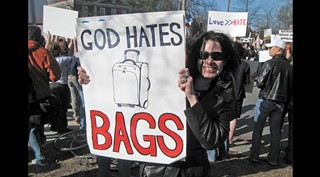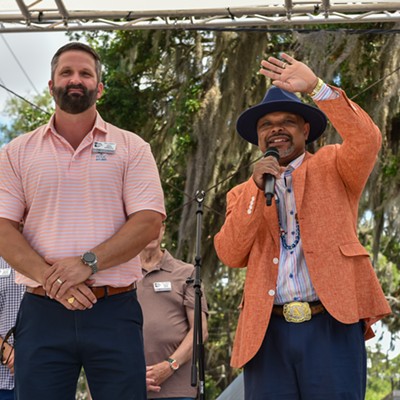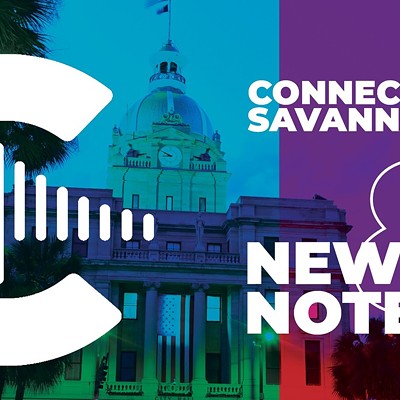The pending arrival here of picketers from the Westboro Baptist Church (WBC) has been widely discussed over the last several weeks, ever since the church’s schedule began to circulate virally.
The church’s national notoriety has grown quickly thanks to the attention–grabbing tactic of protesting newsworthy funerals, including armed forces personnel killed in action overseas, Amish students murdered by a deranged gunman in Pennsylvania, and children killed in a bus accident in Alabama, among others.
The group’s signs – boldly colored, block letters proclaiming “God Hates Fags,” “America is Doomed,” or “Thank God for IEDs” – might be more recognizable than the members themselves.
News of the fringe group’s arrival has become a divisive issue, creating groups who aren’t for or against the WBC’s message — which is almost universally reviled — but who have engaged in lengthy debate over what, exactly, is the appropriate response to their visit, which includes protests at several churches, synagogues and high schools on May 22 and 27.
In the discussions over how to respond to visit by WBC members, responses are split between two camps: Those who believe the attention–seeking church is best thwarted by ignoring them – denying them the satisfaction of recognition – and those who feel that such an egregious affront to the values of tolerance and acceptance must be addressed in order to avoid the perception of tacit consent.
Proponents of a proactive response are plentiful. Planning for counter–protest events began within hours of the news of the WBC’s intentions, including two Facebook events with several thousand confirmed attendees.
Whether those numbers materialize is a separate matter. As was seen during protests against budget cuts to the state’s university system last year, affirmative Facebook RSVPs in the hundreds turned out to be only a few dozen attendees at the actual event.
The GLBT community has also been divided about how to respond. There have been several community meetings since word of the WBC visit began to spread, and several local organizations have joined under a new umbrella group called Savannah Unite to host a candle light vigil in Forsyth Park next week, completely removed from the Westboro events.
“The consensus was that we would meet their aggression with love and peace,” says Kevin Clark, Chapter President of Georgia Equality.
While several groups like the First City Network, Pride and the local Log Cabin Republicans have all signed on to Savannah Unite’s event, there are other GLBT groups like Act Out Savannah, which still plan on counter–protests.
Although the church founded by Rev. Fred Phelps Sr. has been listed as a hate group by the Southern Poverty Law Center for more than a decade, Phelps was fighting a different battle in the ’60s and ’70s as a notable Civil Rights attorney in Topeka, Kansas. He was commended by local African American professional groups and a branch chapter of the NAACP for his work helping to overturn Jim Crow laws in the area.
Phelps was disbarred in Kansas in 1979 after a perjury charge, and then prohibited from practicing law in federal courts in 1989. Most of his children have law degrees, and several still work at the firm he founded in Topeka.
“We research the law carefully,” explains Jonathan Phelps, a son of Rev. Phelps and an attorney. “That’s mostly what I do is make sure our people know the law, that law enforcement know what our people intend to do, and sometimes make sure that law enforcement know what the law is.”
The group’s strict adherence to the law has been a crucial aspect of their continuity – including a victory in March before the Supreme Court (Snyder v. Phelps, et al.), where they appealed a lawsuit against them and secured their right to protest under the First Amendment. The case stemmed from the WBC’s protest of the funeral for Marine Lance Corporal Matthew Snyder in 2006, and a subsequent lawsuit by Snyder’s father for the infliction of undue emotional distress.
“The rest of these Constitutional rights don’t mean squat if we can’t stand out in a public sidewalk or park, those places that are public forums, and engage in wide open public debate,” says Jonathan Phelps.
The fundamental conviction to uphold their religious beliefs and Constitutional law creates ideological contradictions.
When asked why the WBC chose to picket at local high schools, Phelps argues that God’s message has been removed from schools, effectively destroying the “moral compass” of America’s youth.
“The sodomite propaganda taught in the schools is one note,” he says. “There’s not any counter–message, not any fear of God ... Satan’s barf is served up as wholesome food at these high schools.”
A few minutes later, while discussing how closely they work with local enforcement to ensure the group’s safety while publicly protesting, Phelps took a different stance.
“The role of government is to remain completely neutral,” he says. “I’ll concede a point that I don’t want my kids receiving religious instruction in the public schools. In fact, I’ll be the first one to file a lawsuit for a client whose children are being compelled to attend some sort of religious instruction in the public schools.”
The one question that has pervaded most local conversations is, “Why Savannah?” There is no specific reason except that members were going to be in this part of the country, and they hadn’t delivered their message here in a few years (according to Jonathan, they were here once before, although he couldn’t remember when exactly).
Sometimes the group spends weeks planning visits to places, and other times the decision to protest is sudden, sparked by the scent of opportunity, as was the case with Matthew Shepherd’s funeral in 1998.
Jonathan Phelps has been talking with police in Savannah for the last couple of weeks, outlining the group’s itinerary and helping plan for the protests and potential counter–protests.
“The folks from Westboro know how far they can push it,” says Julian Miller, Public Information Officer for the Metro Police Department. “It’s the other protests that can start trouble.”
Because of the group’s legal expertise, many fear lawsuits that could result from inappropriate or aggressive behavior.
The group has a reputation for suing towns that fail to protect them, or that attempt to hinder their right to gather publicly.
“We hold up these signs. We sing some acappella parodies and/or hymns. If you want to listen, fine. If you don’t, fine. It’s not in our control,” says Phelps. “We’re gonna engage in the conduct in a lawful way, and that’s all we’re gonna do.”
While the WBC notified police weeks in advance of their arrival, many others discovered plans via word of mouth, and social media in particular.
“It doesn’t take much for information like that to circulate,” says Kurt Hetager, the Public Information Officer for the Savannah–Chatham Public School System. “We’re fully aware of the discussions and the flier, but we don’t know definitively whether they’ll show or not.”
The school system is trying to maintain calm and order. Each of the high schools being picketed is responsible for distributing relevant information to parents and students as they see fit.
“Security is first and foremost. Other than that, it’s business as usual,” says Hetager.
In another example of the group’s dualities, while their methodology is viewed as contentious, they claim not to actively seek conflict — only to spread the message they believe they’ve been commissioned to deliver.
“We’re not interested in contention with people, but you might have noticed that it appears to be contentious,” says Phelps. “People don’t like it, so they imagine they can engage in some kind of conduct to stop it. To slander us, demonize, vilify, or if they can get by with it, take some physical action, but they don’t get by with that.”
The irony is perhaps best illustrated by the oft–quoted Bible passage from Galatians: “Man reaps what he sows.” If what Westboro claims is true — that they don’t hate and don’t seek confrontation — then their use of hate (even if it’s supposedly God’s hate) and confrontation as tools is also why hate and confrontation are the responses they usually receive.
Regardless of intentions, the WBC is coming to town to exercise their Constitutionally guaranteed right to peaceably assemble in public.
“They get to hear some gospel preaching if they want to,” says Phelps. “If not, they can use those muscles on the side of their neck and turn their head.”
It’s your right to choose how you respond.































